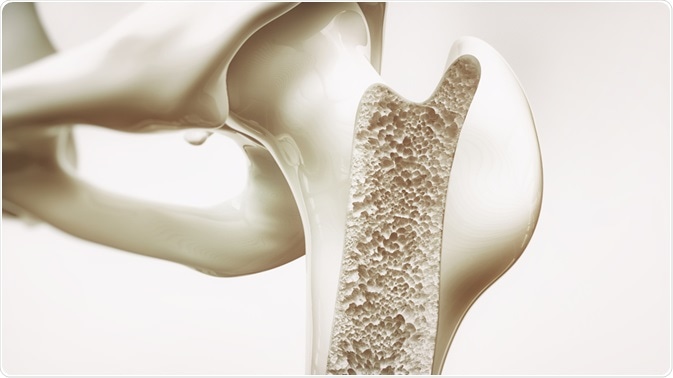
The Effect of Antibiotics on Bone Mass
Novel research has found a link between the antibacterial and antifungal agent triclosan and an increased prevalence of osteoporosis in American females.

Image Credit: Crevis/Shutterstock.com
Researchers from the Hangzhou Medical College School of Public Health, China, found that women with higher urinary levels of triclosan were more likely to have lower bone mineral density.
Previous research has found triclosan to adversely affect the bone density of animals and cell lines. However, very little was known about the effect exposure has on human bone health.
What is Triclosan?
Triclosan is an antibacterial and antifungal agent commonly found in mouthwash, soaps, toothpaste and hand sanitizers. As an endocrine-disrupting chemical, many have been skeptical about its safety, namely, the United States Food and Drug Administration, who banned its use in soap and over-the-counter antiseptic products in 2017 following a lack of evidence that triclosan was safe.
Triclosan and Bone Health
The researchers examined the data from 1,848 women and analyzed the association between bone mineral density and the concentration of triclosan in their urine. The women were divided into three groups based on their triclosan levels.
Those in group 3, with the highest concentrations of triclosan, were found to have the lowest bone mineral density in their femur, lumbar spine, and intertrochanter, compared to women in group 1, with the lowest levels of urinary triclosan.
Furthermore, when compared to those in group 1, women in group 3 were 2.5 times more likely to be diagnosed with osteoporosis of the intertrochanter.
These relationships: the inverse relationship between bone mineral density and urinary triclosan levels; and the positive relationship between triclosan and osteoporosis was found to be stronger in postmenopausal women.
Despite the associations shown, the findings cannot be interpreted as showing that exposure to triclosan causes the onset of osteoporosis. A range of other factors or chemical exposure were not controlled for in the study, and therefore, may have affected the results seen. Some argue that it might be likely that triclosan alters the biochemistry of bones. However, it might be too far to claim that such exposure causes osteoporosis. Furthermore, Professor Hammock from the University of California states that the benefits of triclosan need to be carefully examined to justify its use if there are potential adverse effects.
Additionally, research has found the prescription of some antibiotics to not negatively impact bone health. Type 1 diabetics are associated with a reduction in bone mineral density and increased risk of fracture.
There is evidence to suggest that the prescription of tetracycline derivatives and their beneficial anti-inflammatory and anti-collagenolytic properties may be useful in preventing further deterioration in bone strength.
The research used a mice model to investigate the impact of prescribing doxycycline an antibiotic of tetracycline-class on bone density. They concluded that the long-term use of the antibiotic did not improve the bone disease.
However, it was not deleterious to the biomechanical or microarchitecture of healthy bones in diabetic mice.
Other Adverse Effects of Antibiotic Use
Research has investigated the impact of repeated antibiotic use. The mice study analyzed the impact of the consumption of three short causes of amoxicillin and tylosin – a class of antibiotics commonly prescribed in children.
The mice were either given one of the antibiotics, a mixture of both and, as part of the control group were given none. The amount and number of prescriptions given matched the average amount a child is typically given during the first year of infancy.
The study found that short, high doses of amoxicillin negatively affected bone growth potentially stunting growth while tylosin was associated with long-lasting effects on weight. These findings align with research suggesting that prescribing antibiotics during crucial developmental periods can alter the gut’s bacterial composition and metabolism which can increase the risk of obesity.
Despite the current study being limited to mice, the results align with several other studies that have demonstrated the adverse effects on children of prescribing antibiotics early in life.
Sources
- Cai, S., et al. (2019). Association between urinary triclosan with bone mass density and osteoporosis in the US adult women, 2005-2010. JCEM. Doi: https://doi.org/10.1210/jc.2019-00576.
- Nobel, Y. R. (2015). Metabolic and metagenomic outcome from early-life pulsed antibiotic treatment. Nature Communications. Doi: https://doi.org/10.1038/ncomms8486
- Fowlkes, J. L. (2015). Effects of long-term doxycycline on bone quality and strength in diabetic male DBA/2J mice. Bone Reports. Doi: 10.1016/j.bonr.2014.10.001
Last Updated: Nov 17, 2021